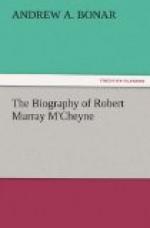When the storm
descends
From
an angry sky,
Ah! where from
the winds
Shall
the vessel fly?
[Away, then—oh,
fly
From
the joys of earth!
Her smile is a
lie—
There’s
a sting in her mirth.]*
When stars are
concealed,
And
rudder gone,
And heaven is
sealed
To
the wandering one
The whirlpool
opes
For
the gallant prize;
And, with all
her hopes,
To
the deep she hies!
But who may tell
Of
the place of woe,
Where the wicked
dwell,
Where
the worldlings go?
For the human
heart
Can
ne’er conceive
What joys are
the part
Of
them who believe;
Nor can justly
think
Of
the cup of death,
Which all must
drink
Who
despise the faith.
Come, leave
the dreams
Of
this transient night,
And bask in the
beams
Of
an endless light.
TRANSCRIBER’S NOTE:
In the original “Memoirs and Remains of
the Reverend Robert
Murray McCheyne”, the passage in brackets
was the first half of
the last, eight-line stanza, and the
following quartet was
part of the eight-line stanza beginning
“When the storm
descends”.
“March 6.—Wild wind and rain all day long. Hebrew class—Psalms. New beauty in the original every time I read. Dr. Welsh—lecture on Pliny’s letter about the Christians of Bithynia. Professor Jameson on quartz. Dr. Chalmers grappling with Hume’s arguments. Evening—Notes, and little else. Mind and body dull.” This is a specimen of his register of daily study.
March 20.—After a few sentences in Latin, concluding with “In meam animam veni, Domine Deus omnipotens,” he writes, “Leaning on a staff of my own devising, it betrayed me, and broke under me. It was not thy staff. Resolving to be a god, Thou showedst me that I was but a man. But my own staff being broken, why may I not lay hold of thine?—Read part of the Life of Jonathan Edwards. How feeble does my spark of Christianity appear beside such a sun! But even his was a borrowed light, and the same source is still open to enlighten me.”
“April 8.—Have found much rest in Him who bore all our burdens for us.”
“April 26.—To-night I ventured to break the ice of unchristian silence. Why should not selfishness be buried beneath the Atlantic in matters so sacred?”
May 6, Saturday evening.—This was the evening previous to the Communion; and in prospect of again declaring himself the Lord’s at his table, he enters into a brief review of his state. He had partaken of the ordinance in May of the year before for the first time; but he was then living at ease, and saw not the solemn nature of the step he took. He now sits down and reviews the past:—




